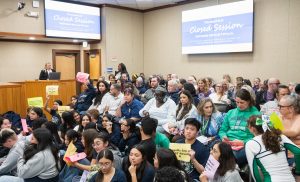Is your employer looking at you with concern? Does your manager constantly ask how you are feeling? It may not be because they care about how long you are going to work. It may be because they care about how long you are going to live.
Welcome to the world of corporate-owned life insurance. Or, as it’s known by its friends, Dead Peasant Insurance.
The wonders of DPI were recently discovered by a bunch of not-yet-dead peasants who work at the Orange County Record, a newspaper in Southern California. According to a Michael Hiltzik article in the Los Angeles Times, their employer sent them a memo requesting permission to take out life insurance policies on them. The only wrinkle — the company would collect the death benefit.
It was at this moment the Record’s employees learned that when a company buys life insurance on its employees, it is not showing its concern for the employees’ families, who may need to replace the measly income of the deceased. Instead, the company is making a bet that if it insures enough employees, sooner or later, the grim reaper will turn the lead that is these marginally useful workers into gold.
To put it in a nutshell: A dead peasant in a coffin is worth more than a live peasant in a cubicle.
It used to be that companies could take out insurance on its employees without getting their permission. This seems fair. If your managers can boss you around while you are living, why shouldn’t they be able to supervise you when you are dead? But a spoilsport Congress insisted that employers get their employees’ agreement to the issuance of the policies, hence the Record’s staff memo. (If one were sufficiently cynical, one might suggest to the management of the Record that a tiny permission slip in the mountain of papers given to new employees in the hiring process would be a better technique. Even if the employee noticed the slip, in this economic environment, who is going to pass up a paying position simply because management will collect a few million simoleons when you are in the prone position?)
If betting on the death of your employees seems unfair, you will probably not be very understanding when I tell you that in the good old days, before complainers got the IRS to change their policies, companies who took out Dead Peasant Insurance actually got a tax break for doing so. As for the big payout that kicks in when the employee kicks it, that is not taxed, either. Since the insurance companies involved also make money by selling the policies in the first place, this makes Dead Peasant Insurance a win-win for just about everybody, except the peasant.
Surprisingly, some embittered employees have sued their employers for capitalizing on their inevitable ends. And some wishy-washy liberal judges have decided against the companies. Factor in the unfair and unreasonable phaseout of certain tax benefits, and you will understand why Dead Peasant Insurance has been largely replaced by Dead Royalty Insurance — policies that big companies take out on the big executives who are deemed so important that the company will face major financial losses if the exec takes an unexpected dirt nap.
Of course, when one considers the major financial disasters put into place and put into motion by so many “key people,” it seems unfair to expect a cash payout when these essential masterminds stroke out. The company benefits enormously simply by not having these bozos around.
Personally, I miss the heyday of Dead Peasant policies. Companies so undervalue their employees, it’s nice for the peasant in question to feel some love from management, even if that love is predicated on their value to the firm when they croak. This insight has given me a brilliant idea — if your company can no longer make itself the beneficiary of a life insurance policy it takes out on you, there’s certainly no law stopping you from making your company the beneficiary of a policy you take out on you.
And if you’re not 100 percent sure the company will use your death benefit in the best possible way, feel free to make me the beneficiary. I promise that every time I start up my new Ferrari and drive to my new beach house, I’ll think of you.
It’s not much, but be honest — it’s a lot more than your company is going to do.
Bob Goldman was an advertising executive at a Fortune 500 company, but he finally wised up and opened Bob Goldman Financial Planning in Sausalito, California. He offers a virtual shoulder to cry on at bob@bgplanning.com.











0 comments